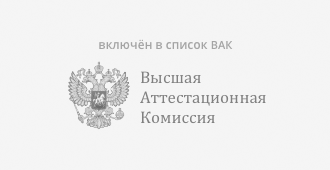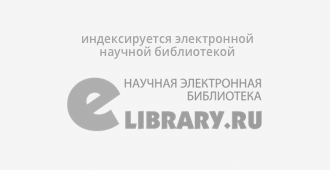Subjective assessment of training methods of stem specialists of student community in the socio-economic space of Russia, Belarus and Hungary
Keywords:
STEM education, training methods, transformation of the higher education system, efficiency of the educational process, social environment, economic environment, socio-economic factors.Abstract
This study presents an analysis of the effectiveness of various training methods used in universities in Russia, Hungary and Belarus for the preparation of bachelors of engineering specialties.
The main purpose of the study is to analyze the opinions of students as the main actors of the educational process, the relevance and effectiveness of educational methods used in universities of countries with similar socio-economic prerequisites of economic management and an identical socio-cultural background. The main objectives of the study were identification of training methods that are most often used in the teaching practice of the university; identification of factors affecting the quality of STEM specialists’ training; identification of the most effective training methods in students’ assessments; comparative analysis of the level of national education and prevailing teaching methods in the higher education system of the studied countries for the objectivity of assessment.
The research methodology involves the use of a qualimetric approach based on generally recognized methods of scientific knowledge: comparison, analogy, induction, deduction, synthesis, etc. due to heuristic and formally logical principles of scientific research.
The methods of the training of STEM professionals applied in all three studied universities (traditional lectures and seminars, online courses, laboratory workshops, master classes, business games, projects, colloquiums and work experience intership) were selected as the evaluated teaching methods. Respondents were asked, based on a subjective assessment, to determine the effectiveness of each method on a ten-point scale, where 10 is the highest efficiency, 1 is the lowest efficiency. The object of the study was the student community of Belarus, Hungary and Russia as a particularly sensitive and accurate indicator of the effectiveness of training methods of STEM specialists.
The result of the study was the identification of the most effective teaching methods applied to the training of STEM specialists with similar conditions of factors of the internal and external environment of the socio-economic space.
Downloads
Metrics
References
Бороненко Т.А., Федотова В.С. Предпосылки цифровой трансформации российской системы образования // Вестник Самарского университета. История, педагогика, филология. 2020. № 2. С. 70–78.
Флек М.Б., Угнич Е.А. Взаимодействие вуза и предприятия: опыт базовой кафедры в подготовке инженерных кадров //Университетское управление: практика и анализ. 2020. № 3. С. 122–136.
Kemmet E., Nidergaus E. FACTORS INFLUENCING THE CHOICE OF STEM EDUCATION IN RUSSIAN AND HUNGARIAN UNIVERSITIES: A COMPARATIVE ANALYSIS // 13th International Conference of Education, Research and Innovation. 2020. P. 2445-2449.
Муллер О.Ю. Теоретические и практические аспекты внедрения проектного обучения в вузе // Гуманитарно-педагогические исследования. 2021. № 1. С. 6–9.
Chulanova O.L., Bogdan E.S. RESEARCH ON FORMATION OF STUDENT’S SOFT SKILLS ENSURING COMPETITIVENESS IN DIGITAL PARADIGM // Lecture Notes in Networks and Systems. 2021. Т. 161. P. 506-513.
Банникова Л.Н., Боронина Л.Н., Вишневский Ю.Р., Нархов Д.Ю., Нидергаус Е.О., Жилин А.С., Шолина И.И. Воспроизводство кадров для инновационной экономики: компаративный анализ. Екатеринбург, 2019. 235 с.
Официальный сайт Министерства науки и высшего образования РФ. [Электронный ресурс]. Режим доступа: https://minobrnauki.gov.ru/action/stat/highed/ (дата обращения: 13.11.2021).
Официальный сайт Венгерского Центрального статистического агентства. [Электронный ресурс]. Режим доступа:
https://www.ksh.hu/stadat_files/okt/en/okt0020.html (дата обращения: 13.11.2021).
Главный информационно-аналитический центр Министерства образования Республики Беларусь. [Электронный ресурс].
Режим доступа: http://www.giac.by/statistika/pokazateli.php (дата обращения: 13.11.2021).
Официальный сайт Министерства науки и высшего образования Российской Федерации. [Электронный ресурс]. Режим доступа: https://minobrnauki.gov.ru/opendata/9710062939-svedeniya-o-chislennosti-studentov-obrazovatelnykh-organizatsiy-osushchestvlyayushchikh-obrazovateln (дата обращения: 13.11.2021).
Официальный сайт Венгерского Центрального статистического агентства. [Электронный ресурс]. Режим доступа: https://www.ksh.hu/stadat_files/okt/en/okt0020.html (дата обращения: 13.11.2021).
Официальный сайт Министерства науки и высшего образования Российской Федерации. [Электронный ресурс]. Режим доступа: https://minobrnauki.gov.ru/opendata/9710062939-svedeniya-o-chislennosti-professorsko-prepodavatelskogo-sostava-obrazovatelnykh-organizatsiy-osushch (дата обращения: 13.11.2021).
Официальный сайт Венгерского Центрального статистического агентства. [Электронный ресурс]. Режим доступа: https://www.ksh.hu/stadat_files/okt/en/okt0020.html (дата обращения: 13.11.2021).
Главный информационно-аналитический центр Министерства образования Республики Беларусь. [Электронный ресурс]. Режим доступа: http://www.giac.by/statistika/pokazateli.php (дата обращения: 13.11.2021).
Федеральная служба государственной статистики. [Электронный ресурс]. Режим доступа: https://rosstat.gov.ru/storage/mediabank/Bul_chislen_nasel-pv_01-01-2021.pdf (дата обращения: 13.11.2021).
Hungarian Central Statistical Office. [Электронный ресурс]. Режим доступа: https://www.ksh.hu/stadat_files/nep/hu/nep0002.html (дата обращения: 13.11.2021).
Национальный статистический комитет Республики Беларусь [Электронный ресурс]. Режим доступа: https://www.belstat.gov.by/ofitsialnaya-statistika/solialnaya-sfera/naselenie-i-migratsiya/naselenie/godovye-dannye/ (дата обращения: 13.11.2021).
Официальный сайт Уральского федерального университета. Об Университете в цифрах. [Электронный ресурс]. Режим доступа: https://urfu.ru/ru/about/today/figures/ (дата обращения: 12.11.2021).
Официальный сайт Белорусского государственного университета информатики и радиоэлектроники. [Электронный ресурс]. Режим доступа: https://www.bsuir.by/ru/bguir-eto (дата обращения: 12.11.2021).
Официальный сайт Университета Дунайврош. [Электронный ресурс]. Режим доступа: http://www.uniduna.hu/en/about-us/brief-history (дата обращения: 12.11.2021).
Рейтинг эффективности национальных систем образования. [Электронный ресурс]. Режим доступа: http://thelearningcurve.pearson.com/ (дата обращения: 14.11.2021).
Аналитический портал Гуманитарные технологии. [Электронный ресурс]. Режим доступа: https://gtmarket.ru/ratings/global-index-of-cognitive-skills-and-educational-attainment/info (дата обращения: 02.05.2021).
Downloads
Published
How to Cite
Issue
Section
Categories
License
Copyright (c) 2021 Е.О. Нидергаус

This work is licensed under a Creative Commons Attribution-NonCommercial-NoDerivatives 4.0 International License.
Авторы, публикующие произведения в журнале «Дискуссия», соглашаются со следующими условиями:
- Авторы сохраняют за собой авторское право и предоставляют журналу право первой публикации произведения, одновременно лицензированной в соответствии с лицензией Creative Commons Attribution, позволяющей другим лицам пользоваться произведением с подтверждением авторства и первоначальной публикации в журнале «Дискуссия».
- Авторы вправе заключать с иными лицами лицензионные договоры на условиях простой (неисключительной) лицензии на использование опубликованного в журнале «Дискуссия» произведения (например, размещение его в базах данных университетов, публикация в книге), со ссылкой на его оригинальную публикацию в этом журнале.
- Автор гарантирует, что является правообладателем всех материалов, предоставляемых в редакцию, и что исключительные права на данные материалы не переданы или не предоставлены другим лицам.
- Авторам разрешено и рекомендуется размещать свое произведение в Интернете до и во время процесса подачи, поскольку это может привести к продуктивному обмену, а также к более раннему и более широкому цитированию опубликованных работ.
С момента загрузки произведения и сопроводительных материалов через раздел "Отправка материалов", автор полностью и безоговорочно принимает (акцептует) публичную оферту о заключении авторского соглашения об опубликовании произведения. В соотвтетствии с этим соглашением автор предоставляет издателю на безвозмездной основе неисключительную лицензию на использование созданного автором произведения.
С момента получения произведения и прилагаемых к нему материалов журнал "Дискуссия" вправе использовать полученные произведения без ограничений по своему усмотрению и в пределах всего срока действия исключительных прав, но с обязательным указанием имени автора (авторов) произведения, в том числе публиковать произведения (полностью или в сокращении) на территории всего мира, переводить на другие языки, направлять в репозитории научной информации, размещать в сети Интернет и использовать другими законными способами.









